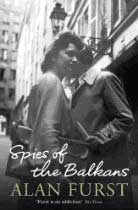
SPIES OF THE BALKANS
Alan Furst
Weidenfeld & Nicholson £18.99 Hbk
Released: June 17th 2010
Reviewer: Mike Ripley|
|
SPIES OF THE BALKANSAlan FurstWeidenfeld & Nicholson £18.99 Hbk Released: June 17th 2010 Reviewer: Mike Ripley |
|
Mike Ripley is the author of the Angel series as well as historical mysteries. He is also a keen archaeologist. His trade column: GETTING AWAY WITH MURDER appears monthly in SHOTS. |
|
Alan Furst is an
American who writes very ‘British’ spy stories, all with historical (and
very accurate) settings and mostly without any British characters at
all. His period is the early years of the Second World War and his
settings usually Eastern Europe; and he writes them very, very well
indeed. His new novels examines five months in the life of an intelligent, gentle hero – a Greek policeman, Costa Zannis, brave and romantic but no superhero – as he, by force of circumstances, is drawn into the world of espionage. His personal world is the old city port of Salonika in northern Greece in late 1940. To the east is the border with Turkey, an ancient foe; to the west is Albania and a new enemy in the shape of Mussolini’s invading legions. And to the north lie the Balkan states of Bulgaria, Yugoslavia, Roumania and Hungary which, for the moment, provide a buffer zone between Greece and Hitler’s expanding Nazi empire. That buffer zone also provides a dangerous escape route for Jews fleeing from Germany and Zannis, out of simple humanity, becomes involved in setting up and running one of the successful escape lines from Berlin through Budapest, Belgrade, Salonika and into neutral Turkey. So successful is he at this – and at avoiding the Gestapo on a side-visit to occupied Paris – that Zannis comes to the attention of British intelligence and though, as a loyal Greek, he is a reluctant spy for anyone, the connection turns out to be a life-saving one when the Nazis eventually attack and he has to organise the escape of his family and loved ones. Anyone expecting an action thriller with all guns blazing should look elsewhere. For those who prefer their thrillers subtle and informative, with characters brimming with humanity, cannot possibly do better. Furst is a fine writer. His prose is spare and never overblown and his research, which is clearly extensive, into his settings and period never swamps the story. (In fact there were times I wanted to know more about the history and politics of this area, which has been much neglected in spy fiction since the glory days of Eric Ambler.) Above all, Furst creates characters the reader really cares about: real human beings put into impossible situations and you cannot help but cheer them on and hope they survive.
|

| Page By Gary Cane [Contact] | ||
| Webmaster: Tony 'Grog' Roberts [Contact] |